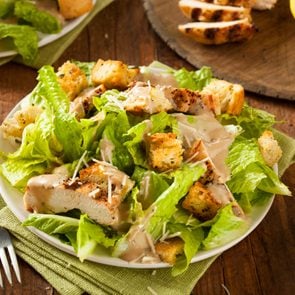The Biggest Mistake You Can Make When Cooking Pasta
Updated: Nov. 02, 2022

You might not even realize the trouble it causes.
To a hungry cook in a hurry, no quick-and-easy meal is quite like plain, old pasta. Toss together some noodles and sauce, and voila! Dinner is served. There’s just one problem: Most of us don’t have the patience (or time) to wait for the pot to boil. But if you think you can save a few minutes by using a smaller pot, you might want to think again.
Sure, the logic makes sense at first. Using a smaller pot means you need less water, which will speed up the boiling process. But this little mistake could make a big difference for your plate of pasta, chefs say. That’s not the only kitchen mistake you’re probably making, either.
First of all, long noodles might not fit in a small pot unless you snap them in half. Some Italians swear that breaking pasta is bad luck, while others say it’s just bad cooking form.
But there’s another reason why you should pay more attention to your water-to-pasta ratio. “If you use too small of a pot, the water temperature drops too much when you add the pasta so it takes a long time to heat back up. This makes your pasta mushy and you’ll often find it clumps together,” James Schend, Deputy Editor of Taste of Home told Reader’s Digest. “When cooking pasta, you really need to go big. Reach for the pot that can hold at least a gallon of water plus a pound of pasta with a little room to spare.”
As for how much water to use, Schend had some more advice for at-home chefs. “You want to make sure there is plenty of room for the pasta to move around in the boiling water without feeling cramped. I always use between 5 and 6 quarts of water for every pound of pasta. This gives the pasta plenty of room to move around while cooking, so you avoid them clumping together, but not too big that it takes forever to bring the water to a boil in the first place,” he said. “A 6 or 7-quart Dutch oven is the smallest size pot I’d use for cooking one pound of pasta. If you’re cooking more than a pound, consider doing it in batches if you don’t have a very large pot.”
Some more mistakes Schend thinks you’re probably making? Not saving your pasta water—here’s why you should always save your pasta water—and rinsing your pasta after you cook it. Rinsing the pasta will remove starch and a lot of flavor from the pasta which means your sauce won’t cling as it should. Make sure you’re also regularly stirring your pasta to keep it from sticking together and add lots of salt to your pasta water. While you may think that is meant to season the pasta (and it does do that, too), Schend tells us that the real reason is salty water helps scratches the surface of the pasta making it less smooth and sticky. Next, learn why you should be adding sugar to your spaghetti and meatballs.




















